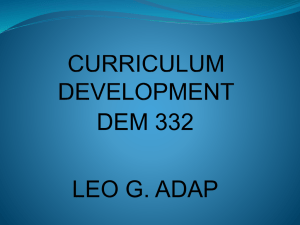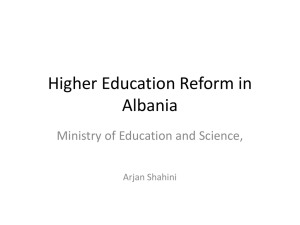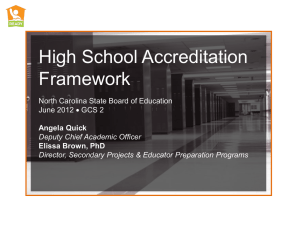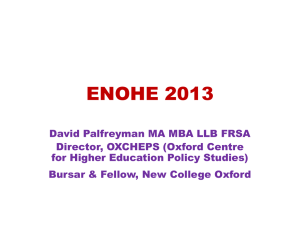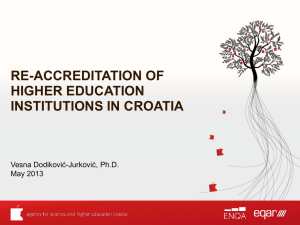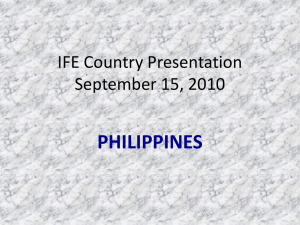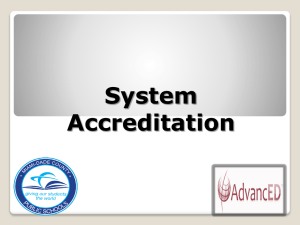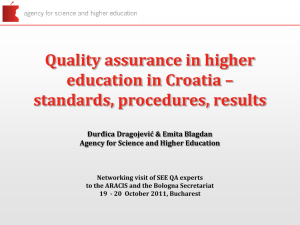the portuguese system for quality assurance in higher
advertisement
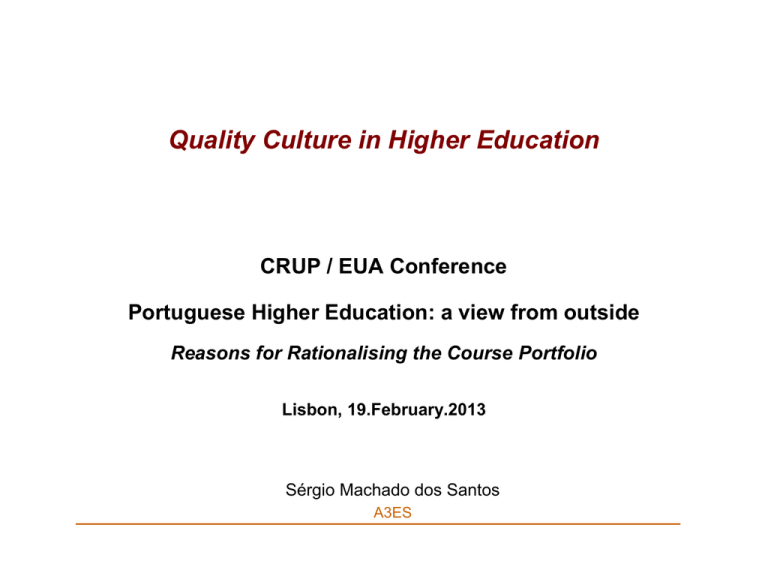
Quality Culture in Higher Education CRUP / EUA Conference Portuguese Higher Education: a view from outside Reasons for Rationalising the Course Portfolio Lisbon, 19.February.2013 Sérgio Machado dos Santos A3ES Quality culture in Higher Education QA fundamental underlying principle • “Consistent with the principle of institutional autonomy, the primary responsibility for quality assurance in higher education lies with each institution itself and this provides the basis for real accountability of the academic system within the national quality framework” [Berlin Communiqué] • “Providers of higher education have the primary responsibility for the quality of their provision and its assurance” “There should be encouragement of a culture of quality within higher education institutions” [ENQA - ESG] European trends on QA in the last decade The influence of the Bologna Process • The adoption and transposition of the ESG to the national legal frameworks - impact on HE systems and HEIs • The influence of ENQA - membership criteria - cooperation / capacity building • The adoption of programme accreditation in Western Europe (emphasis on accountability!) Lack of trust on HE institutions European trends on QA in the last decade Concerns with accountability-led QA processes • Difficulties in conciliating accountability and enhancement • Emphasis on accountability may induce conformity rather than improvement • Cases have arisen where there has been a movement away from accreditation of programmes or at least where this has been discussed, towards the adoption of approaches at an institutional level which are less intrusive (2008 ENQA Survey) Stronger emphasis on internal QA systems A Shift in Purpose From Accountability to Quality Enhancement • The added-value of accreditation - Unquestionable, in the official recognition of qualifications - In an effective improvement of quality in higher education? Little added-value in repeating a round of programme accreditation • HEIs are becoming more responsible and transparent - Significant progress in the development of internal QA systems - Embedding of a quality culture within the academic communities • Tendency towards less intrusive external QA mechanisms - More in line with the autonomy and self-responsibility of HEIs - More appropriate to stimulate the emphasis on quality enhancement • But: a social climate of trust on HEIs and on the quality of teaching is needed! The Portuguese QA System New system set up in 2007 • New degree programmes need previous accreditation ex-ante accreditation – initiated in 2009/10 (yearly) • Degree programmes in operation to be regularly assessed and accredited (every six years) ex-post accreditation launched in 2010; evaluation procedures started in 2011 Main process: Programme accreditation Full round of assessment/accreditation: 2011/12 to 2015/16 Any visible rationalisation effects on institutional portfolios? Portfolio rationalisation through self-regulation DEGREE PROGRAMMES IN FEBRUARY 2010 Programmes in operation (officially recognised) 5.262 Submitted to preliminary accreditation 4.379 Cancelled by HEIs 883 DEGREE PROGRAMMES IN FEBRUARY 2013 Programmes in operation that were accredited Programmes with preliminar accreditation Accredited after on-site visit Programmes that were cancelled Cancelled by HEIs With a negative decision on accreditation by A3ES New programmes accredited by A3ES 3.691 70,1% 3.384 307 1.571 ↓ 29,9% 1.457 27,7% 114 2,2% 664 ↑12,6% Quality culture within HEIs Development of internal QA systems • Development of QA instruments • Participation of students / feedback from stakeholders • Cases of external certification (ISO 9001) • Main problem: comprehensiveness (insufficient coherence/ no holistic vision) Need for some guidance Quality culture within HEIs Guidance by A3ES • Study on European practices and trends, open to public discussion • Set of reference points aligned with part 1 of the ESG (in terms of statements characterising a sound and well developed IQAS) • Meetings with coordinating bodies and Seminars with HEIs • Development of an Audit model to assess and certify IQAS - Experimental exercise in 2012 involving 5 HEIs - Now open to all HEIs (voluntary participation) Quality culture within HEIs Motivation for an Audit process in Portugal • To support HEIs in the development of their internal QA systems (discussion, definition and dissemination of standards) • To stimulate HEIs in assuming the main responsibility for the quality of their educational provision • To contribute (under previously specified quality standards) to simplify programme accreditation processes in the next accreditation round. A “lighter-touch” approach Building trust on HEIs • Certification of internal quality assurance systems • Performance of institutions in the assessment/accreditation round 2012-2016 “Risk-management” approach • Programme accreditation to stay - but less intensive (e.g., by sampling) in the case of excellent or above average quality HE Units • Model to be discussed with the HEIs. “Quality (...) must remain the prime criterion of course viability”
